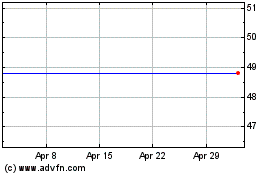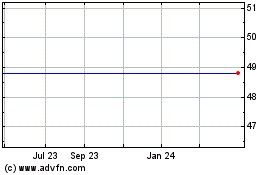Exelon Joins Group of Supporters Backing Legislation to Achieve 100 Percent Clean Energy in Northern Illinois
March 14 2019 - 1:29PM
Business Wire
Environmental, community and business
leaders join in support of House bill responding to new federal
regulations that would prevent existing state clean energy programs
from working as intended to support climate goals
Exelon today joined environmental organizations, community
leaders, business groups and lawmakers in supporting legislation
that will preserve and expand clean energy in Illinois, put the
state on track to achieve 100 percent carbon-free power for
customers in northern Illinois and meet statewide commitments under
the U.S. Climate Alliance. The legislation also guarantees that
customers will save money on their energy bills starting in the
first year of implementation.
Introduced by state Rep. Larry Walsh Jr. (D-Joliet), the Clean
Energy Progress Act addresses new federal regulations that
interfere with existing state clean energy programs that were
intended to support solar, wind, nuclear and other clean energy
resources.
Among other provisions, the legislation will protect the
progress achieved under the 2016 Future Energy Jobs Act (FEJA),
which laid a path for Illinois to lead the nation in clean energy
through the preservation of zero-carbon nuclear power and the
advancement of renewable energy. The bipartisan FEJA passed with
support from more than 200 business, labor, environmental,
faith-based and other groups and has worked to advance the state’s
climate goals and grow clean-energy jobs while keeping energy costs
stable for customers.
However, the Federal Energy Regulatory Commission (FERC) has
proposed new regulations that would change the way regional grid
operator PJM procures generating capacity for customers in northern
Illinois, 12 other states and the District of Columbia. The new
market rules would interfere with key provisions in the FEJA, as
well as other long-standing state programs that support wind, solar
and other forms of renewable energy. The regulations would also
raise costs to consumers and further tilt the market in favor of
polluting power sources.
The Clean Energy Progress Act addresses these concerns by
directing the Illinois Power Agency (IPA), which already oversees
power and renewable purchases for the state’s largest utilities, to
take over responsibility for procuring clean generation capacity on
behalf of residents in northern Illinois. In addition, the
legislation would:
- Guarantee savings for consumers
beginning in the first year of implementation and continuing
throughout the program, adjusted for inflation;
- Increase the development of new
renewable resources, like wind and solar, and make it possible to
achieve 100 percent carbon-free power for millions of citizens in
northern Illinois;
- Allow Illinois’ nuclear plants, which
produce more than 90 percent of the state’s zero-carbon energy, to
sell clean capacity into the IPA procurement;
- Put Illinois on track to meet
commitments set forth by Gov. J.B. Pritzker as part of joining the
U.S. Climate Alliance; and
- Implement reforms to the state’s
competitive retail electricity and natural gas markets that protect
consumers from bad actors and misleading business practices, while
maintaining the benefits of customer choice through greater
oversight of the competitive energy supplier industry and
protections for the most vulnerable consumers.
“The Clean Energy Progress Act recognizes there is an urgent
demand from Illinois energy customers for common-sense solutions to
address climate change,” said Chris Crane, president and CEO of
Exelon. “We stand with our customers and the many other supporters
of this legislation who want cleaner air, good jobs and affordable
electricity.”
“It’s important that Chicago and our state continue down the
path to embracing and supporting a vibrant, clean-energy economy,”
said Jack Lavin, president and CEO, Chicagoland Chamber of
Commerce. “The Future Energy Jobs Act (FEJA) was an historic step
toward our state achieving that goal, but we cannot afford to let
federal regulators winnow away the progress that was made for our
economy and our environment. It’s important that any energy
legislation keeps prices competitive for our members.”
“Air pollution causes severe public health impacts, especially
in our most vulnerable communities,” said Norris McDonald, founder
and president of the African American Environmentalist
Association. “Nuclear and other sources of clean energy
don’t emit harmful pollutants that can worsen asthma and other
conditions, and that’s why allowing the state to take control of
its clean energy decisions is an important way of achieving
environmental justice.”
“Illinois nuclear plants provide enormous economic support for
the surrounding communities, especially for local schools,” said
Mark Mitchell, superintendent of the Reed-Custer school district.
“The Reed-Custer school district receives millions in property tax
revenue from Braidwood Station.”
“Many businesses in the Byron area benefit because of the
presence of Exelon Generation’s nuclear facility,” said Sarah
Downs, executive director of the Byron Area Chamber of Commerce.
“During the annual plant refueling outages, our retailers get a
boost from the hundreds of contract workers who flock to the area.
This added work each year really makes a difference in the bottom
line of many of our businesses.”
“Morris receives the benefit of having the employees and
management employed at Dresden living within our community and
supporting our community through property taxes, income taxes and
beyond,” Morris Mayor Dick Kopczick said. “They’ve been a great
supporter of Morris schools and nonprofits through donations of
both money and time. It’s been a good relationship for Morris, and
it’s one that we don’t want to end.”
About Exelon
Exelon Corporation (NYSE: EXC) is a Fortune 100 energy company
with the largest number of electricity and natural gas customers in
the U.S. Exelon does business in 48 states, the District of
Columbia and Canada and had 2018 revenue of $36 billion. Exelon
serves approximately 10 million customers in Delaware, the District
of Columbia, Illinois, Maryland, New Jersey and Pennsylvania
through its Atlantic City Electric, BGE, ComEd, Delmarva Power,
PECO and Pepco subsidiaries. Exelon is one of the largest
competitive U.S. power generators, with more than 32,000 megawatts
of nuclear, gas, wind, solar and hydroelectric generating capacity
comprising one of the nation’s cleanest and lowest-cost power
generation fleets. The company’s Constellation business unit
provides energy products and services to approximately 2 million
residential, public sector and business customers, including more
than two-thirds of the Fortune 100. Follow Exelon on Twitter
@Exelon.
View source
version on businesswire.com: https://www.businesswire.com/news/home/20190314005718/en/
Linsey
Wisniewski630-657-4209linsey.wisniewski@exeloncorp.com
Exelon (NYSE:EXC)
Historical Stock Chart
From Mar 2024 to Apr 2024

Exelon (NYSE:EXC)
Historical Stock Chart
From Apr 2023 to Apr 2024
